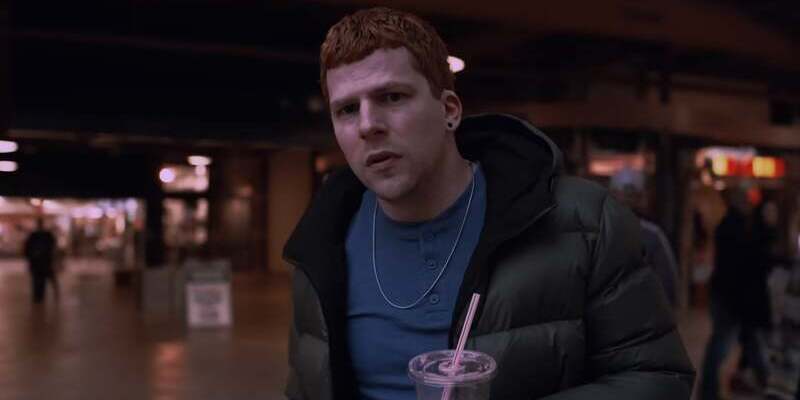
Review by
Eric Hillis
Directed by: John Trengrove
Starring: Jesse Eisenberg, Adrien Brody, Odessa Young, Sallieu Sesay, Philip
Ettinger, Ethan Suplee, Evan Jonigkeit, Caleb Eberhardt

South African writer/director John Trengrove follows up his
acclaimed 2017 debut
The Wound
with a disastrous transition to American filmmaking in
Manodrome. Like The Wound, it's another story of an alienated gay man seeking kinship, but in
tying this idea into the incel movement, Trengrove finds himself in
waters he's incapable of convincingly navigating.

A buffed up Jesse Eisenberg plays Ralphie, a loner who was
recently fired from his job and now ekes out a living as a rideshare
driver. Yes, the allusions to Taxi Driver are that
thuddingly obvious. Living with a pregnant girlfriend (Odessa Young) from whom he's become increasingly estranged, Ralphie is only a loner
in the sense that he desires male companionship. At his gym he can't
help staring at Ahmet (Sallieu Sesay), an African man who teases
Ralphie, fully aware of how he's tortured by his sexuality.
It may be somewhat derivative, but there's enough there for the makings
of an intriguing examination of male insecurity. Trengrove's film
becomes confused and directionless when Ralphie is introduced to a cult
of men lead by Dad Dan (Adrien Brody). Based in Dan's
impressively large house on the outskirts of the city, the men have a
half-baked philosophy centred on rejecting the company of women, or as
they call it, the "gynosphere." Like recovering alcoholics at an AA
meeting, they boast about how long it is since they last had intercourse
with a member of the opposite sex.

The whole setup is so laughable that it might have made for a smart
black comedy, but Trengrove makes the terrible decision to play this
scenario with a straight face. The sombre lighting and music tell us
we're watching a very gritty drama, but it's impossible to take
Manodrome seriously. Dad Dan and his cult are simply too
underdeveloped for us to accept them. Trengrove takes his cues from
Fight Club in a scene in which the cult members mosh to
heavy metal music in an almost homoerotic ritual, but that's as much
insight into how the cult functions as we're offered. Aside from the
closeted Ralphie, none of the other members appear to be gay, which
makes you wonder why they would purposely deny themselves sexual contact
with women. Incels may hate women, but aren't they obsessed with the
idea of treating them as sexual objects?

Early on Ralphie rifles through Chekhov's drawing room and discovers
his gun, leaving us in little doubt as to where the narrative is headed.
If Trengrove is giving us a character study of the sort of troubled
young men who are increasingly shooting startling numbers of people in
the US, he's not doing a very convincing job. Unlike the tortured
protagonist of the similarly themed but far superior recent indie drama
The Mental State, we never get inside Ralphie's head. This isn't the fault of
Eisenberg, who gives a deeply committed performance. There's something
unsettling about seeing the actor's head on the buff body of a frat bro
in arrested development, and Esienberg astutely weaves his contradictory
physicality into his performance, always holding his chin up like
someone desperate to be able to look down on others. But we're never
able to penetrate Ralphie's aloofness. It's as if there's nothing inside
him, as though he literally has no soul. Maybe that's the point, but it
doesn't make sense that a man this vapid would have ever found himself
in the position of being able to acquire a girlfriend, let alone
convince her to have his child.


